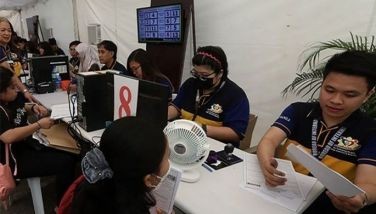Global Pinoy

A statistical chart from Statista recently revealed that the Philippines is the third largest source of highly educated migrants to OECD countries.
OECD, or the Organization for Economic Co-operation and Development, is an intergovernmental economic organization of 37 developed countries founded in 1961 to stimulate economic progress and world trade.
On top of the list of countries with the most migrants to OECD countries is India. China is next. We are third.
Overall, OECD data reveals around 120 million migrants living in OECD member countries. Thirty to 35 percent of these migrants are considered highly educated, meaning they have received vocational or academic training.
India, which topped the list, comprises 65 percent of migrants considered to have high education status. China had a rate of 48.6 percent.
The Philippines, 3rd in rank behind India and China – the world’s two biggest countries, accounts for 53.3 percent of immigrants to the OECD and considered highly educated. That probably doesn’t count teachers and other college graduates who work as domestic helpers abroad for better than what they would get locally.
In a paper on the Philippines, the International Labor Organization finds that many of those high skilled migrants – to OECD countries and elsewhere were health care professionals, especially nurses. I imagine there are also a lot of engineers, teachers, finance specialists and ship officers and crew.
Around half of Filipino migrants in the OECD chose the United States. It was identified by the OECD as one of the most important migration corridors, behind Mexican and Indian immigration to the United States and ahead of Polish immigration to Germany.
Of course, we are no longer surprised by now. The Global Pinoy is a phenomenon we are familiar with. Filipinos are found even in some of the world’s most remote areas. Indeed, ABS-CBN established its global operations to cater to this Global Pinoy, mostly in the Middle East, Europe and North America.
But can we sustain our position as a major exporter of highly educated workers given that the next generations seem unable to read, write and count based on international tests?
Our facility with English has helped us get a foothold in foreign households and businesses. We are losing this advantage, something we can see with a lot of posts on social media.
In any case, there are other important considerations. Our success in foreign shores came with a price, a stiff one in terms of family cohesiveness. The Filipino family of today has changed dramatically from the generations before we started sending our workers abroad.
I recall seeing a survey made by a consumer marketing company many years ago that revealed the emotional scars of OFW children. Without the guidance of parents, many children took to drugs and bad company.
The other finding, I recall, is about many OFW children dreaming of going abroad themselves. It seems they are in a hurry to get out of the country, having lost faith in the country’s ability to provide for their future.
I can guess the ones who don’t mind staying here dream of becoming lawyers so they can become government officials or bureaucrats who can become rich by hook or by crook.
There are those in our ruling elite who often bemoan the so-called “brain drain” of our trained and educated workers. But they do nothing to keep them here beyond issuing edicts to prevent their departure, like what Duterte did to prevent medical workers from leaving this year.
The Global Pinoys know the value of their services in the world market. They know the local market is unwilling to pay them what is their real worth, And so, they leave.
Actually, the migration of medical professionals is now more about nurses and some medical technicians. Our doctors no longer go abroad the day after graduation the way they did in the ‘60s and ’70s. You are more likely to be treated by an Indian doctor in a US clinic now than by a Pinoy.
Indeed, Filipino doctors who want to go to the US take up nursing and keep their being doctors a secret. Perhaps, our local doctors are happy being here. For post graduate training, they go somewhere closer, like Singapore.
It is a different story for nurses. The thousands of nursing graduates we produce every year are almost all for export. Many of them are working for call centers while waiting to leave.
Our nurses are not appreciated here. They are overworked and underpaid. Even the Labor Secretary is urging them to go on strike for a better deal.
I am told the situation is the same for other industries. In construction, the really good workers are now abroad. The spate of serious accidents involving big crane operators is supposedly because the best operators have left the country. Local construction firms are fielding less trained and less experienced ones out of exigency.
For academics in science and technology, it is the same story of underappreciation of their value. No money for research. One senator even castigated them for what she called, a fixation for research. We can’t blame them for choosing to work abroad where their credentials mean something.
And because we don’t have enough science and technology professionals, this will result in a skills and employment gap that may leave 2.4 million local skilled jobs vacant and unfilled, according to Rep. Joey Salceda. Imagine all those local vacancies amidst a high unemployment and underemployment rate.
We have become a country where the fondest dream of its people is to get out. It is easy to suspect that we are left with dregs like our politicians and those unable to break out of the limitations imposed on them by a substandard educational system.
It is good to know we are appreciated abroad. But why can’t we replicate the good news Global Pinoys enjoy abroad at home?
Boo Chanco’s e-mail address is [email protected]. Follow him on Twitter @boochanco
- Latest
- Trending


























